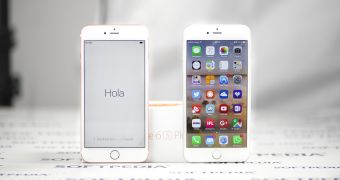Little is being known officially about the upcoming iPhone 7, but Apple partners and companies involved in the development process are one by one dropping hints about the upgrades that could be available on the device.
The latest to do it is none other than Qualcomm CEO Steve Mollenkopf who said in a recent meeting with analysts that his company is expecting a significant loss in the coming months, as one of the biggest partners is planning to switch to a different supplier for a future model.
While Mollenkopf hasn’t provided any hints regarding the customer that could change sides, it’s not difficult to decrypt the message. Most likely, the company that the Qualcomm CEO is talking about is Apple, as sources familiar with the matter said that Cupertino could actually go for an Intel modem for the next-generation iPhone.
The first time we reported about Apple looking at an Intel modem was in October 2015 when the iPhone maker was still evaluating the switch. At that time, Apple assigned several top engineers to look at Intel’s 7360 LTE modem and it appears that results are so satisfying that the company wants to place a big order for the upcoming iPhone 7.
Cupertino is reportedly working together with Intel to further optimize this particular modem, so company engineers traveled to Munich to find new ways to improve the chip.
Intel’s 7360 LTE modem
Currently, iPhone models on the market come with Qualcomm LTE modems, and although Apple has never complained about this configuration, the company is reportedly looking for advanced capabilities and its choice seems to be Intel’s 7360 LTE chip.
The main reason for this is that the 7360 allows for download speeds up to 450 Mbps and upload up to 100 Mbps, which is exactly what Apple is aiming with the upcoming iPhone 7. Cupertino wants its next model to be super fast and the Intel chip is the best way to go.
The 7360 LTE chip is more efficient than existing chips, so Apple could at the same time benefit from lower power consumption, and also offers carrier aggregation support across TDD and FDD spectrum, which enables high-speed data services and thus creates more opportunities for Apple and developers looking to offer online services to iPhone buyers.
What’s also interesting is that the same chip offers dual-SIM support, and although there are no plans for such an iPhone at the moment, it leaves the door open should Apple decide to go in this direction at some point in the future.
And last but not least, Intel designed the chip to accommodate a wider range of form factors, including both small smartphones such as the 4-inch iPhone SE, but also bigger devices that are part of the phablet category. This means the iPhone 7 Plus (or even the rumored Pro version) could use it too.
Without a doubt, there are a lot of uncertain things for now, but as far as Apple is concerned, Intel seems to be the next partner for iPhone modems. The unveiling should take place in September, so expect more info to leak in the coming months.

 14 DAY TRIAL //
14 DAY TRIAL //